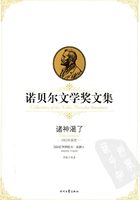In the case just mentioned we find ourselves in presence of a sort of undivided mark, composed, like that of Germany, of a certain number of villages possessing lands in common. These lands are pastures. Other charters of the same period show us cases in which the undivided area of the mark or volost was composed of forest ground. Expressions like the following are frequent in the documents just mentioned: "The forest belongs to the commune (selo) and the villages in common (vopsche), or "this" piece of forest ground has been given to me by the volost (the mark), the elder, and the peasants."No one had the right to clear the forest or reclaim the waste land lying within the limits of a volost, unless authorised to do so by the elders and the assembly of peasants. This fact appears clearly in the following instance: in 1524, three persons found some salt wells on the shores of Dvina in the midst of a dark forest. They addressed a petition to the Government asking to be recognized as the legal possessors of the place, and they supported their demand by the following argument: "Not one of the surrounding marks or volosts has any appurtenances in the place."Had it been otherwise, had the wells been situated on the appurtenances of a volost, no private person could have made the demand just mentioned. The marks or volosts jealously watched over the integrity of their boundaries, and that from the earliest times. In the "Lives of the Saints," those early monuments of our written literature, complaint is sometimes made of peasants doing their best to get rid of a hermit, established in a neighbouring forest, "because," says the hagiographer, "they feared he would assign to some monastery a part of the ground they owned."*The charters give, as I have already said, very little information about the internal arrangements of the volost and village; all we know is that the settlements were very far from resembling those large assemblages of people which are known in our days under the name of "slobodi." As a rule the "derevnia" or village contained few hearths, and the villages were scattered over the whole area of the volost. The wastes and forests were used in common, while the meadows and arable fields became the object of private appropriation. No equality of shares seem to have existed, the charters constantly mentioning the "best men,""the men of wealth," (jitii liudi) side by side with the "smaller men" (molodschii). Some few seem to have had even no part at all in the possessions of the soil, being known under the name of podsousedi or podsousedki, which means living under the authority of a neighbour or villager (sosed). These persons were regularly employed as agricultural labourers. Some few, the so-called "bobili," were possessed of small parcels of land, resembling in that the cottarii of Domesday Book. The agricultural area owned by each homestead was known by the name of "jrebii," which means a lot, and the sense which men of the thirteenth and fourteenth centuries attached to this term is revealed to us by an old Russian translation of some parts of the Byzantine codes, the Prochiron and the Eclogue. This translation in certain points appears to be a kind of adaptation of Greek legislation to the conditions of the Russian people. One of the paragraphs of these so-called "Books of the Law" (Zakonnii Knigi, chap. xii) contains the following sentence: "If a division of land shall take place by which some person shall injure the interest of others in their plots (jrebii) the division must not be maintained."*The jrebii being a plot of land enjoyed by a single household out of the agricultural area of the mark, a plot which need not necessarily be equal to those of the neighbours, we are right in saying that the village community of the free peasants of Muscovy was like that of the Cossacks of the Dnieper. This likeness is to a certain extent obscured by the financial arrangements which the Muscovite volost entered into in order to secure the yearly payment of the land tax, these arrangements, as well as the tax itself, being quite unknown to Little Russian communes.
The Muscovite administration formerly empowered the volosts to distribute the taxes imposed on the villages, according to the quantity of cultivated land together with the commons thereto annexed, possessed by them. The sum to be paid by the inhabitants of each subdivision of the mark was then divided among the various households according to the extent of their possessions.
The unit of taxation was the land of a plough. I mean the amount of land which one plough. working the whole day, could turn up.
This unit was known by the name of "socha." Some homesteads owned two, three, or more of these, but there were others who held only a portion of this unit, just as in mediaeval England there were households owning entire virgates, or the half or third part of a virgate, and in Germany there were holders of "mansi pleni et mansi dimidii," "ganze und halbe Hufen." As serfdom was unknown and no mutual responsibility in matters of taxation bound the peasant to the soil he occupied, undivided households very often quitted their dwellings in order to settle in some neighbouring country, on lands still free of occupation, or on those liberally accorded to new-comers by their private owners, on condition of a small payment.















